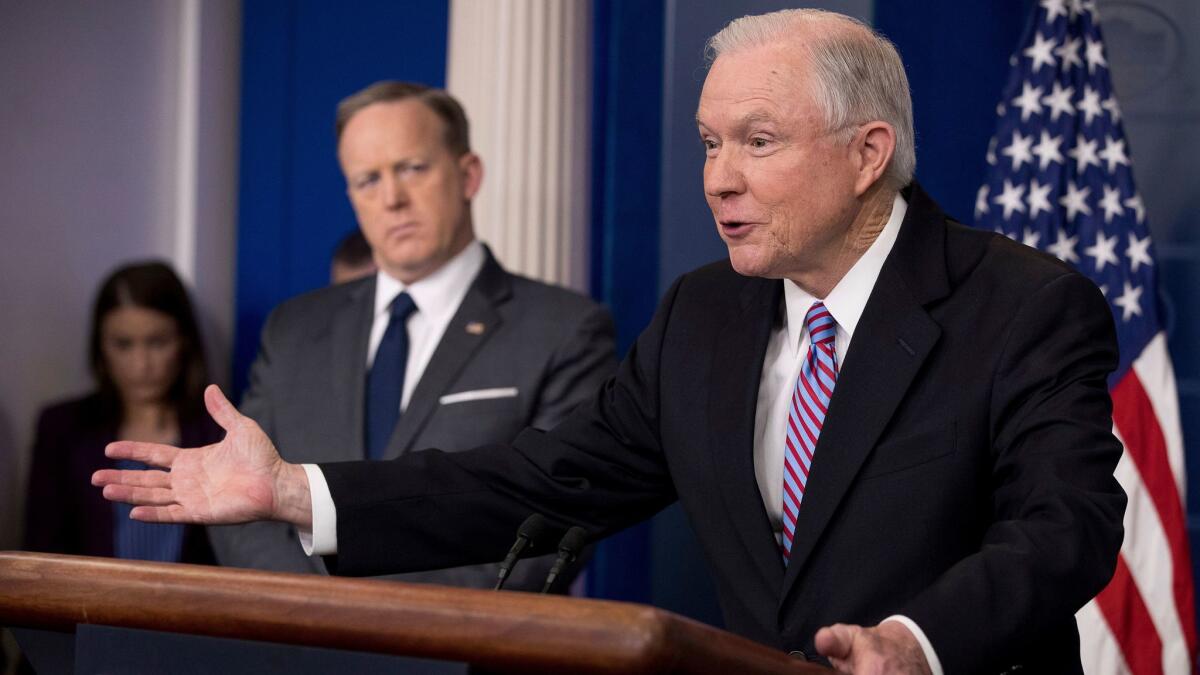Editorial: An ill-timed time-out for police reform

- Share via
It is fortunate for the people of Baltimore that a judge on Friday rejected the U.S. Justice Department’s attempt to delay, and perhaps scuttle, an agreement to reform that city’s struggling police department. The agreement was supported by the police chief, the mayor and, judging from testimony at a federal court hearing last week, Baltimore residents, activists and community leaders — everyone, it seems, but the Trump administration. Over the objection of U.S. Atty. Gen. Jeff Sessions, the agreement is now a consent decree. A court-appointed monitor will oversee changes in police training, tactics, operations, data tracking and other matters.
Other cities may not be so lucky. Sessions is leading a stunning retreat from the federal government’s largely positive involvement in police reform. His order late last month to review “existing and contemplated consent decrees” came too late for the Justice Department to renege on the Baltimore agreement because it had been signed and filed in court during the Obama administration. But the process has not yet reached that stage in Chicago, where the police department is in dire need of an overhaul. It’s now unlikely to get it in the form of federal oversight.
Sessions’ lamentable see-no-evil approach to policing appears to rest on several misconceptions about public safety. One is that police fight crime best when allowed to do their jobs without interference from outsiders, and that more oversight means more crime.
Sessions’ lamentable see-no-evil approach to policing appears to rest on several misconceptions about public safety.
That’s a philosophy that has a certain surface appeal for those who see crime as a war fought by opposing troops. But experience has brought a much more sophisticated grasp of public safety. Confidence in law enforcement — the knowledge among law-abiding citizens that they can seek police help without putting themselves, their families or strangers in unwarranted danger — provides a crucial environment for crime prevention. In communities riven by years of mistrust, misunderstanding and abuse, that confidence is difficult or impossible to achieve without an outside fact-finder and independent monitor.
Sessions also argues that law enforcement is and should remain a local matter, and so it should — but the local view in Baltimore and many other cities is that outside help is needed in order for the local department to function properly. The Justice Department is best positioned to provide that help after more than 20 years of consent decrees that have led to smarter, safer and more effective police tactics and better civilian oversight.
Sessions also argues that the “misdeeds of individual bad actors should not impugn or undermine the legitimate and honorable work” of police. In other words, if there is a problem in policing, it’s that there may be a few bad cops, and the solution should be to weed them out.
That stance flies in the face of decades of experience in policing reform, civil rights litigation and successful consent decrees.
In the early 1990s, after the beating of Rodney King, it was tempting to believe that any problems in the LAPD could be attributed to 44 “problem officers” identified by the Christopher Commission. But the commission’s report made clear that the systemic problems in the LAPD went far beyond those individuals and included training, command structure, and a department-wide culture that promoted discrimination, bigotry and secrecy.
In the Rampart scandal several years later, public attention focused on the crimes of a single officer, Rafael Perez, and then a single unit, and then one police division. But the Justice Department found a pattern of persistent department-wide civil rights violations, and in 2001 entered into a consent decree with the LAPD.
Four years after the decree was lifted, the standard of policing in Los Angeles is vastly improved. Criticism continues, much of it focused on individual officers involved in deadly uses of force. Activists have decried the lack of criminal charges in almost every case.
But even these critics see that controversial acts of officers come in the context of an entire culture and structure of policing that requires ongoing improvements in training, tactics and oversight. In that sense their grasp of the issue is considerably firmer than Sessions’.
In Chicago and elsewhere, officials have vowed to press forward with police reforms even without the Justice Department. And they should. The momentum for change generated during the Obama administration may carry forward even in the absence of support from the federal government. But federal abdication will make their jobs unnecessarily difficult.
Follow the Opinion section on Twitter @latimesopinion and Facebook
A cure for the common opinion
Get thought-provoking perspectives with our weekly newsletter.
You may occasionally receive promotional content from the Los Angeles Times.






